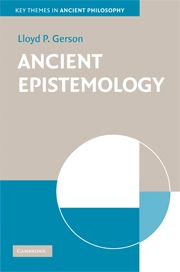Book contents
2 - The origin of epistemology
Published online by Cambridge University Press: 05 June 2012
Summary
Despite the fragmentary nature of the evidence regarding the thought of the Presocratics, there is little doubt that recognisably epistemological claims and questions arise practically simultaneously with philosophy itself. In this chapter, I will try to explain why epistemology was inseparable from the enterprise of philosophy as the ancient Greeks understood it. Among other results, I hope to show why the Sceptic Sextus Empiricus, some eight hundred years later, looking back on the entire history of philosophy as he knew it, was correct in seeing that an attack on the possibility of knowledge was virtually an attack on philosophy itself. As Sextus realised, philosophers supposed that they were aiming at wisdom and wisdom was a sort of knowledge. If knowledge is not possible, the quest for wisdom as traditionally conceived is vain.
Philosophy begins in ancient Greece with a simple hypothesis: nature (phusis) is or has an order (kosmos) or structure. If nature has an order or is structured, that order is intelligible. It is subject to reasoning or argument or understanding, in short, to logos. The idea of a kosmos is closely related to the idea of a universe or world. The idea that nature is a kosmos appears to sit closely alongside the idea that there is a single or unique order to nature. In this sense, ancient cosmological speculation from its inception bears the hallmark of scientific reductionism, that is, the operating assumption that multiple explanations are themselves ultimately reducible to or derived from a single explanation.
- Type
- Chapter
- Information
- Ancient Epistemology , pp. 14 - 26Publisher: Cambridge University PressPrint publication year: 2009



